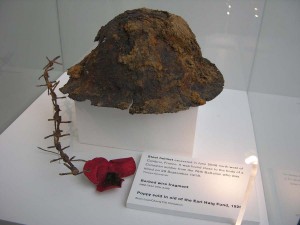
Helmet, barbed wire and poppy from the Imperial War Museum 2008 exhibition "In Memoriam".
James Graham Ballard was born and raised in the Shanghai International Settlement in November 1930. In 1943 Ballard became a civilian internee at the Lunghua Civilian Assembly Center with his parents and sister. His experiences formed the basis of his book
Empire of the Sun.
In 1987 Steven Speilberg directed the film of the same name and chose the Welsh lullaby Sun Gân for the opening sequence. The lullaby written about 1800, and whose composer remains anonymous, places the listener in the arms of their mother at comfort and in warmth. However, though the lyrics impart safety the haunting melody suggests the harsh realities of another world.
“Harm will not meet you in sleep” is an English translation of the fifth line, “Ni cha’ dim amharu’th gyntun”.
I have just watched Empire of the Sun once again and will continue to do so well into the future. There is so much to observe as it plays along and with a watchful eye I seek its symbols and symbolism as it passes before my eyes. It is a journey…a circle…watch it…hear it.
Films like these make us think about the past, to a specific time, and for some they make us want to learn more. Maybe one day it will take me to Shanghai, and in some ways maybe one day it will help me create a film. Certainly there are parts from all these classics that I watch that I treasure and take with me on my travels. When standing on the field of battle, in a church that housed the wounded, or at a place of solemn reflection, by bringing all these experiences and passion, knowledge and the desire to learn, perhaps a bit of that soul that stood before can be found again.
Tags: Empire of the Sun, James Ballard, Shanghai, Suo Gan
This entry was posted by pferguson
on Friday, August 26th, 2011 at 8:52 pm and is filed under Our Thoughts.
You can follow any responses to this entry through the RSS 2.0 feed.
You can leave a response, or trackback from your own site.
About The Author

Paul has worked with the Paradigm Motion Picture Company since 2009 as producer, historian and research specialist. Paul first met Casey and Ian WIlliams of Paradigm in April 2007 at Ieper (Ypres), Belgium when ceremonies were being held for the re-dedication of the Vimy Memorial, France.
Paul's sensitivity to film was developed at an early age seeing his first films at RCAF Zweibrucken, Germany and Sardinia. Paul returned to Canada in 1967 and was captivated by David Lean's "Lawrence of Arabia" and "Bridge on the River Kwai". Over time Paul became increasingly interested in storytelling, content development, character, direction, cinematography, narration and soundtracks.
At the University of Victoria, Paul studied and compared Japanese and Australian film and became interested in Australian film maker Peter Weir and his film "Gallipoli" (1981). Paul was inspired when he learned Weir visited the beaches, ridges and ravines of the peninsula. "Gallipoli", the film, led Paul on many journeys to sites of conflict in England, France, Belgium, Holland, Germany, Malta, Hawaii, Gallipoli, North Macedonia and Salonika.
When Paul first watched documentary filmmaker Ken Burns, "The Civil War", Paul understood how his own experience and insight could be effective and perhaps influential in film-making. Combining his knowledge of Museums and Archives, exhibitions and idea strategies with his film interests was a natural progression.
Paul thinks like a film-maker. His passion for history and storytelling brings to Paradigm an eye (and ear) to the keen and sensitive interests of; content development, the understanding of successful and relational use of collections, imagery and voice. Like Paul's favorite actor, Peter O'Toole, Paul believes in the adage “To deepen not broaden.”
While on this path Paul always remembers his grandmother whose father did not return from the Great War and how his loss shaped her life and how her experience continues to guide him.


Comments